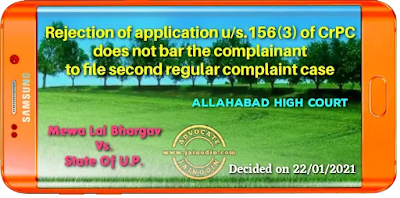It is well settled that where a statute provides for election to an office, or an authority or institution and if it further provides a machinery or forum for determination of dispute arising out of election, the aggrieved person should pursue his remedy before the forum provided by the statute. While considering an election dispute it must be kept in mind that the right to vote, contest or dispute election is neither a
25 January 2021
Right to vote, contest or dispute election is not fundamental right
24 January 2021
Rejection of application u/s.156(3) of CrPC does not bar the complainant to file second regular complaint case
The Magistrate may dismiss the complaint under Section 156(3) Cr.P.C. if by way of instituting complaint, defence version is created to absolve the complainant from the case registered earlier or on the basis of allegations made in the complainant, if dispute is purely of civil nature or the Magistrate considers that the complaint is false and frivolous. The Magistrate has to power to test the truth and veracity of the allegations levelled against the proposed accused persons and if there is no substance in the averments of the complainant then at pre-cognizance stage, the complaint may be dismissed under section 156(3) Cr.P.C.[Para No.8]
...........
On the basis of facts narrated in the complaint, the complainant is capable to adduce evidence regarding alleged incident of misappropriation of property of government school and trees, etc., by the respondents. The respondents abused the complainant indicating his caste as per the facts narrated in the complaint. These facts may be proved by adducing evidence by the complainant. This fact that respondents are pressurizing the complainant to compromise the matter is within the knowledge of complainant, it may also be proved by the complainant by adducing evidence.[Para No.11]
...........
On the basis of above discussions, this appeal is liable to be dismissed.[Para No.13]
...........
Learned Second Additional Sessions Judge / Special Judge, (S.C./S.T. Act), Lakhimpur Kheri has considered the facts on the basis of which complaint under Section 156(3) Cr.P.C. was instituted by the complainant. At post cognizance stage the complainant may institute regular complaint on the basis of which, the learned Second Additional Sessions Judge/ Special Judge, (S.C./S.T. Act), Lakhimpur Kheri may record statement of complainant under Section 200 Cr.P.C. and the evidence under Section 202 Cr.P.C. and proceed according to law on regular complaint if instituted by the complainant. The impugned order dated 15.12.2020 will have no effect on the regular complaint, if instituted by the complainant [Para No.15]
Subscribe to:
Posts (Atom)


